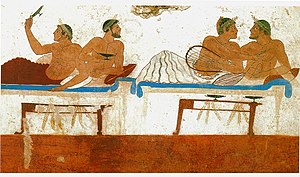Perjantanan di Yunani Kuno
Perjantanan di Yunani kuno adalah hubungan sosial yang diakui antara orang dewasa dan seorang laki-laki yang lebih muda biasanya yang masih di usia remaja.[1] Ini adalah karakteristik dari Kuno dan periode Klasik.[2] Beberapa ahli menemukan asal-usulnya dalam ritual inisiasi, terutama ritus peralihan di Kreta, di mana dikaitkan dengan pintu masuk ke dalam kehidupan militer dan agama Zeus.[3]

Terminologi
Asal mula
Aspek sosial
Aspek politik
Pandangan filosofis
Dalam seni
Praktek seksual
Konvensi puitis
Dalam mitos dan agama
Karakteristik regional
Yunani timur
Sparta
Megara
Athena
Boeotia
Pengetahuan modern
Referensi
- ^ C.D.C. Reeve, Plato on Love: Lysis, Symposium, Phaedrus, Alcibiades with Selections from Republic and Laws (Hackett, 2006), p. xxi online; Martti Nissinen, Homoeroticism in the Biblical World: A Historical Perspective, translated by Kirsi Stjerna (Augsburg Fortress, 1998, 2004), p. 57 online; Nigel Blake et al., Education in an Age of Nihilism (Routledge, 2000), p. 183 online.
- ^ Nissinen, Homoeroticism in the Biblical World, p. 57; William Armstrong Percy III, "Reconsiderations about Greek Homosexualities," in Same–Sex Desire and Love in Greco-Roman Antiquity and in the Classical Tradition of the West (Binghamton: Haworth, 2005), p. 17. Sexual variety, not excluding paiderastia, was characteristic of the Hellenistic era; see Peter Green, "Sex and Classical Literature," in Classical Bearings: Interpreting Ancient Culture and History (University of California Press, 1989, 1998), p. 146 online.
- ^ Robert B. Koehl, "The Chieftain Cup and a Minoan Rite of Passage," Journal of Hellenic Studies 106 (1986) 99–110, with a survey of the relevant scholarship including that of Arthur Evans (p. 100) and others such as H. Jeanmaire and R.F. Willetts (pp. 104–105); Deborah Kamen, "The Life Cycle in Archaic Greece," in The Cambridge Companion to Archaic Greece (Cambridge University Press, 2007), pp. 91–92. Kenneth Dover, a pioneer in the study of Greek homosexuality, rejects the initiation theory of origin; see "Greek Homosexuality and Initiation," in Que(e)rying Religion: A Critical Anthology (Continuum, 1997), pp. 19–38. For Dover, it seems, the argument that Greek paiderastia as a social custom was related to rites of passage constitutes a denial of homosexuality as natural or innate; this may be to overstate or misrepresent what the initiatory theorists have said. The initiatory theory does not claim to account for the existence of homosexuality, but for formal paiderastia.